The First Global Conference, held in 1999, in Amsterdam, The Netherlands |
|
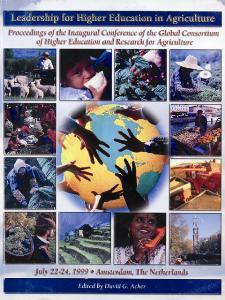 |
On July 22-24, 1999, the Global Consortium of Agricultural Universities held its first global conference in Amsterdam . The theme selected for the conference was Leadership for Higher Education in Agriculture . The conference was attended by senior leaders from agricultural universities and affiliated organizations around the world. In total, 130 individuals participated, from 32 different countries. The conference spawned many connections between individuals and among institutions. It also yielded nine working groups on topics such as a global student loan program, curriculum reform, distance education, leadership development, and globalization of teaching. Two important meetings were held in conjunction with the conference. The first was a meeting of the Founding and Organizing Committees of the Consortium. This body reviewed the progress fo the Consortium during its first year of operation, voted to change the name to the Global Consortium of Higher Education and Research for Agriculture (GCHERA), and voted to elect an Executive Committee to replace the original two committees. The second meeting was a meeting of the leadership teams of the US based Board on Agriculture of the National Association of State Universities and Land Grant Colleges (NASULGC) and the European Inter-University Conference of Agriculture and Related Universities (ICA). Observations from the conference included the following:
|
The Second Global Conference, held in 2001, in San Francisco, California, USA |
|
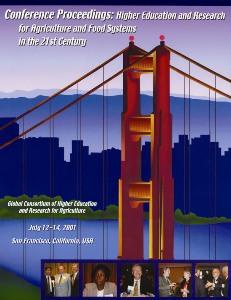 |
The 2001 conference, which met in San Francisco from July 12-14, attracted over 200 educators and research scientists from 50 countries around the world. The participants heard from prominent leaders on a variety of subjects addressing the conference theme: “Higher Education and Research for Agriculture and Food Systems in the 21st Century”. The presenters were grouped under four major sub-themes: New Science in a New Century; The Changing Nature of Food Systems and the University Response; Agricultural Curricula for the 21st Century; and organizing the University of the Future.
|
The Third Global Conference, held in 2003, in Kiev, Ukraine
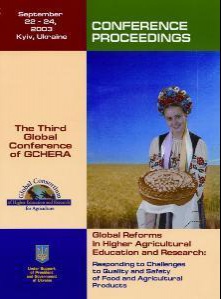
Theme:
Global Reforms in Higher Agricultural Education and Research: Responding to Challenges to Quality and Safety of Food and Agricultural Products.
Sub-themes of the conference:
1. Development of GCHERA recommendations for agricultural universities (faculties) in regards to curricula and syllabi content and methods, and their practical implementation in academic programmes for bachelors and masters in agriculture, forestry, fisheries and veterinary medicine according to such fields of specialization:
-
-
-
-
-
-
- Agronomy (including Plant Protection, Agrochemistry, Soil Science, Horticulture);
- Animal Sciences (including Water Bio Resources and Aquaculture);
- Agricultural Products Processing and Storage;
- Forestry, Park Gardening and Landscape Architecture;
- Biotechnologies in Agriculture, Quality and Safety of GMO Products, Methods of Diagnostics;
- Mechanization, Electrification and Automation for Agriculture and Forestry;
- Agricultural Machines and Equipment;
- Agricultural Economics;
- Agricultural Marketing and Management;
- Veterinary Medicine;
- Standardization and Certification of Agricultural, Forestry and Fisheries Products;
- Agricultural Ecology and Environmental Protection;
- Land Resources Management and Agrarian Law;
- Fundamental Natural and Social Sciences in Agricultural Education;
- Postgraduate Education and Extension.
-
-
-
-
-
2. Experience in implementation of up-to-date information technologies in education (studying and teaching materials, software, distance learning, etc.).
3. Academic leadership, institutional reform and university management issues.
4. Student leadership, international student organizations and networks.
5. International programmes and projects for education and research in agriculture, forestry,fishery and veterinary medicine.
The Fourth Global Conference, held in 2005, in Hangzhou, China
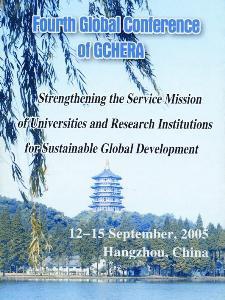
Theme: Strengthening the Service Mission of Universities and Research Institutions for Sustainable Global Development.
Sub-themes:
- Reforming Institutional System in Higher Education and Research for Agriculture
- TReorienting Research to Support the Service and Outreach Mission
- International Collaboration to Enhance Service as a Global Mission of Universities and Research Institutions
- Extension as a Component of the Service Mission for Global Development
The Fifth Global Conference, held in 2007, in San José, Costa Rica
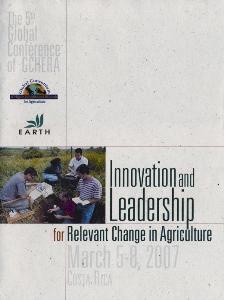
220 participants from 47 countries around the world gathered in San Jose, Costa Ricaon March 5-8, 2007 for the Fifth Global Conference of the GCHERA. The focus for the meeting was "Innovation and Leadership for Relevant Change in Agriculture", referring to the following challenge issued by conference organizers: Agricultural higher education is in danger of becoming irrelevant, and change is needed. Universities must respond to society's changing needs, and agriculture must become more economically competitive, socially responsible, and environmentally sustainable in an increasingly globalized world economy.
Conference sub-themes:
Leadership. This sub-theme examined the development of leadership on two levels; the first being those structures and processes within the university that foster leadership in students, graduates, and faculty, and the second being those that result in universities emerging as leaders.
Innovation. This sub-theme examined innovation on all levels in higher agricultural education; from innovation in curriculum structure, content, delivery, and evaluation, to innovation in governance and organizational structure.
Entrepreneurship. Entrepreneurship was examined in the context of the academic program, the university's internal policies and organization, and also as the university relates to the external environment. How does the university effectively train students to become entrepreneurs? What is the role of values in entrepreneurship? How do you foster an ethical and entrepreneurial mindset in students and faculty?
Government and University Relations. Discussion in this sub-theme area focused upon relationships between the university and government, and the establishment of effective, mutually beneficial collaboration. Discussion in this sub-theme included agricultural education and research as an engine of economic growth, the university as a consultant and source of technical expertise and backstopping to the government, university financing, university governance, autonomy and public and private partnerships.
Environment and Natural Resources. The focus of higher agricultural education has been steadily shifting away from an exclusive emphasis on production to the development of integrated, sustainable systems-largely due to looming environmental threats such as deforestation, soil erosion, water scarcity and distribution, climate change, loss of biodiversity, and dependency on fossil fuels
The Sixth Global Conference, held in 2009 in Nairobi, Kenya
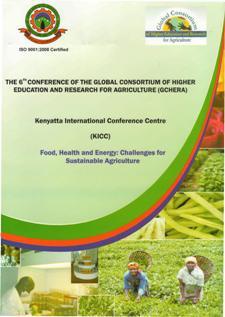
The 6th GCHERA 2009 Conference was held in Nairobi, Kenya in the African continent.
The International Conference in Kenya (6th GCHERA Conference) availed a forum for international exchange of modern technologies, scientific views and cultural trends in the training of undergraduate and post-graduate students, as well as part of one global family.
Main theme
“Food, Health and Energy: Challenges for Sustainable Agriculture”
Sub themes
Agriculture and Food Security. The quest for food security has led many to look toward another “Green Revolution”.
The subtheme focused on long-term challenges facing world agriculture and how the development and appropriate use of agricultural knowledge, science and technologies can be brought to bear on reducing hunger and poverty.
Agriculture and health. Agriculture supports health by providing food and nutrition for the world’s people and by generating income that can be spent on healthcare. In addition most medicines are from agricultural produce and hence great opportunity for pharmaceuticals. So coordinating agriculture and health interventions can yield significant welfare benefits. There therefore needs to be a precise linkage between the two sectors. Issues like the challenges to linking agriculture and health in policy, multiple, bidirectional linkages between agriculture and health were discussed. Opportunities for Improving the Synergies between Agriculture and Health were also explored.
Agriculture and sustainability. The focus of this sub-theme was to increase adoption of diverse agricultural innovations by creating sustainable networks, improving policy frameworks, farmer, industries and private sector participation in agricultural education, research and development, and creating sustainable agricultural systems. Land ethics that considers the long-term good of all members of the land community will also be discussed. Prudent use of renewable and/or recyclable resources, protection of the integrity of natural systems so that natural resources are continually regenerated.
Agriculture and Energy. This subtheme focuses on the challenges and opportunities of advancing modern bioenergy technology, in general, and on the technical, environmental and economic benefits of the energy function of agriculture. The most effective government policies that have expanded renewable energy production were explored. Recent trends in energy use in agriculture, renewable energy production opportunities; the policies that have helped foster those opportunities, and the prospects for renewable energy markets were also discussed.
Climate change. Despite technological advances, such as improved varieties, genetically modified organisms, and irrigation systems, weather is still a key factor in agricultural productivity, as well as soil properties and natural communities. The agricultural sector is also a driving force in the gas emissions and land use effects thought to cause climate change. [Impact of climate change on agriculture and Impact of agriculture on climate change were discussed here.
The 7th Global Conference, held in 2011 in Beauvais, France
This time conference participants met in Europe. The Conference was hosted by Institute Polytechnique LaSalle Beauvais, gathering together 250 delegates from about 80 institutions of over the 50 countries all over the world.
This conference addressed experience of innovative developments taking place in universities worldwide and path-breaking critiques, in both developing and developed economies, with regard to the:
- roles of Universities of Agriculture and Life Sciences in sustainable rural development at scientific, educational, societal and economic levels,
- development of new partnerships between the Universities of Agriculture and Life Sciences at the local level in relation to local economic development, and with regional and global organisations which support sustainable rural development, and
- positioning, organisation and management of Universities of Agriculture and Life Sciences in achieving these roles, at local, regional and global levels
The 7th Conference gave the opportunity to the Representatives of the Global Regional University Associations and the GCHERA Executive Committee members to establish a new confederation , with direct membership of the Associations instead of the universities alone.
GCHERA will stand with its former acronym but is now called: Global Confederation of Higher Education Associations for the Agricultural and Life Sciences.